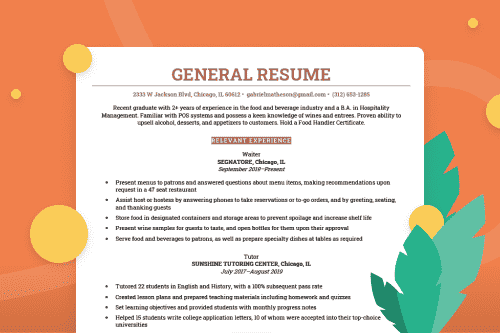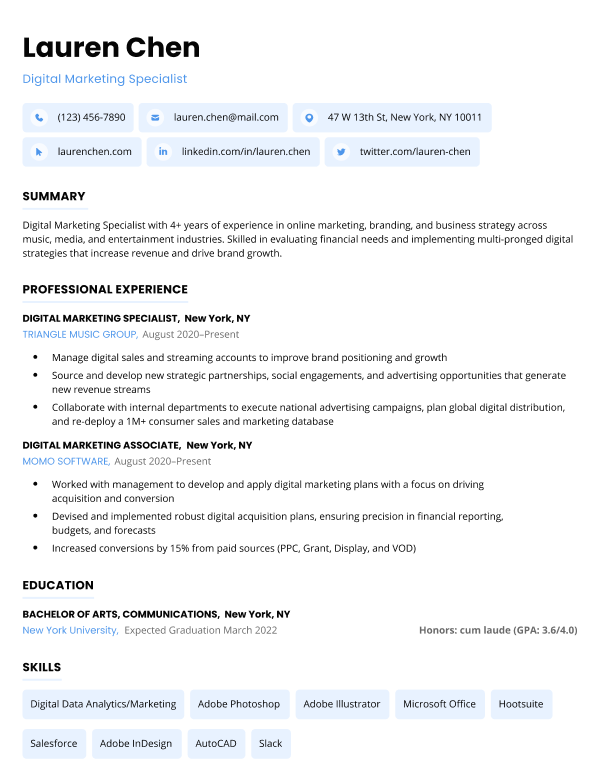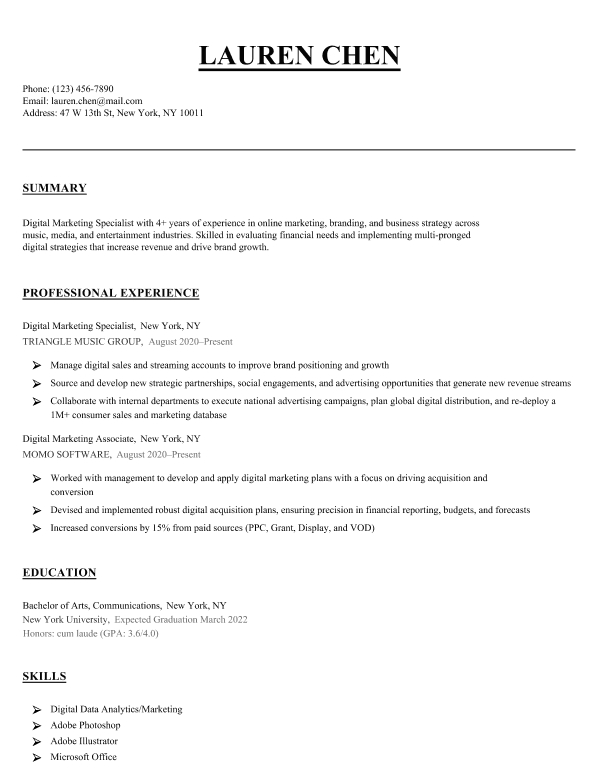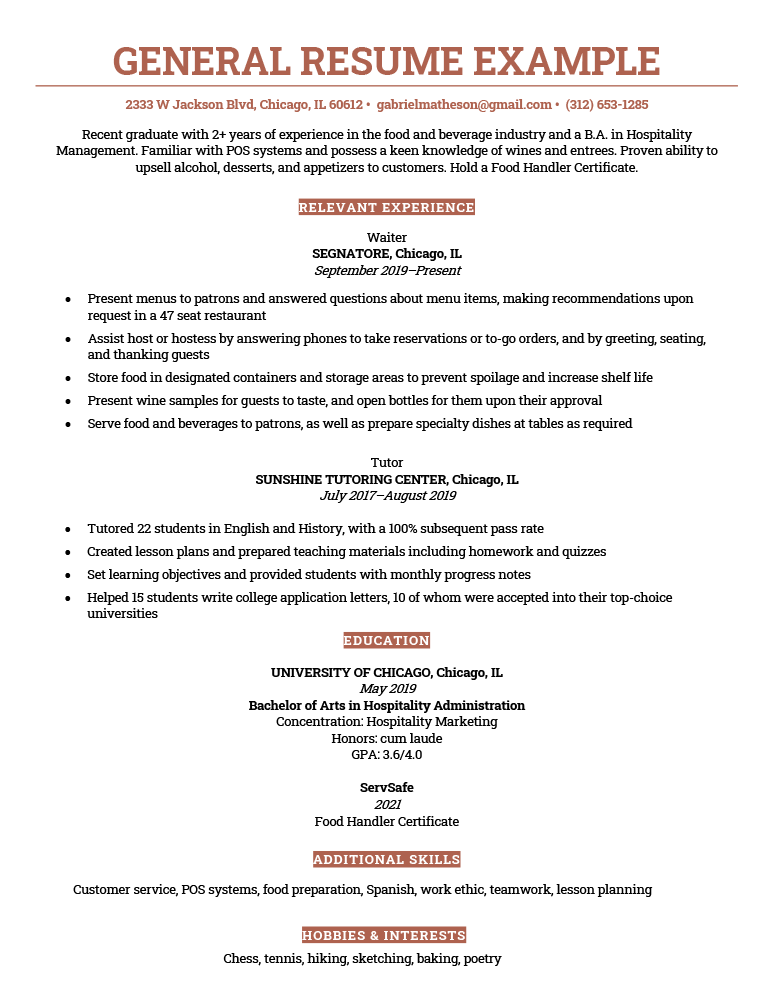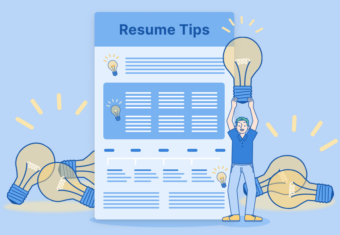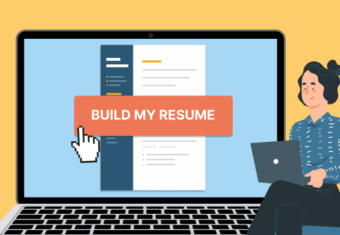Using a general resume and general cover letter that focuses on your broad qualifications is a great way to save time and effort in situations when you need to provide a resume to numerous employers. We’ll tell you when and how to use a general resume to apply for jobs.
Our free-to-use resume builder can make you a resume in as little as 5 minutes. Just pick the template you want, and our software will format everything for you.
Should you use a general resume?
Yes, you should use a general resume if you’re applying to a lot of jobs at once (for instance, if you’re attending a job fair). While we always recommend tailoring your resume to each job if possible, a general resume is still an effective way to highlight your experience and skills while saving time.
Use the following general resume examples and tips to write a master resume that showcases all your greatest professional strengths:
2 general resume examples
Here’s an example of a general resume written by a recent graduate with limited work experience:
General resume example
Generic resume template
And here’s a template for you to customize:
Resume introduction
Your resume introduction should tell employers about your professional background and spotlight your most relevant skills, certifications and accomplishments.
Professional experience
Job title
Company name, City, State
- Include 3-5 bullet points that highlight your work-related accomplishments.
- Quantify your achievements by adding hard numbers whenever possible.
- Give specific examples rather than a general overview of your duties.
Education
School name, City, State
Degree
GPA (optional)
Skills
- Make a bulleted list of skills relevant to your industry
- Include both hard and soft skills to show that you’re a well-rounded candidate.
- Check different job ads to see what skills are generally required in your field
Additional sections
Add additional sections such as certifications or hobbies if it helps strengthen your resume.
How to write a generic resume
Here’s how to make a general resume that still grabs the attention of employers:
1. Use a general resume template
The simpler and more generic the resume template you pick, the better. Avoid creative templates with decorative fonts, images, or graphics and stick to a simple layout.
More basic-looking resume designs are appropriate for a wide variety of jobs, from highly formal positions to more casual ones. Giving your resume a simple, minimalist look makes it easy to apply to any job, even if it’s at a more buttoned-up, traditional office.
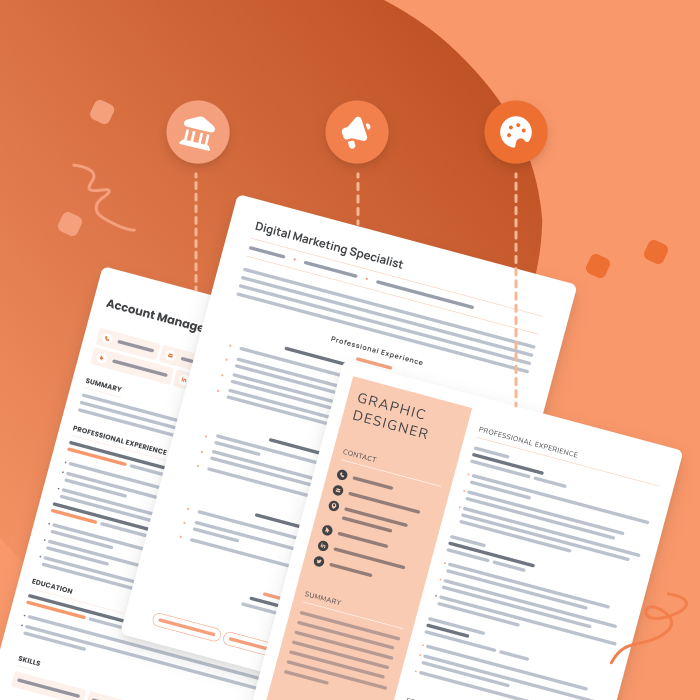
Resume examples for different industries
Not sure what your resume should look like? The best way to learn is by taking inspiration from resume examples written by other candidates in your industry.
2. Choose the right resume format
The most common resume format is the chronological resume, and it’s the best option for a general resume.
That’s because chronological resumes list your jobs from most recent to least recent, giving you a clear overview of your work experience. Regardless of what position you’re targeting, a chronological resume will do the trick.
3. Use a generic resume summary
A good resume introduction showcases your most relevant qualities. When you’re putting together your general resume, however, write a generic resume summary that fits the general industry you’re applying for work in.
For example, if you’re trying to land a job in retail, draw attention to your customer service skills, multitasking abilities, and persuasion skills. Here’s a good generic resume summary example:

This resume summary can easily be adjusted to match the specific requirements of different retail positions.
Want to save time? Use a resume summary generator to make a convincing summary in a few seconds.
4. Write down your work-related accomplishments
Not all your professional accomplishments will be relevant to every role, so when you write a general resume, focus on ones that show that you possess qualities that are generally highly sought after in your field.
If you’re saving a copy of your general resume for future use, update it from time to time to add new achievements. Otherwise, it’s easy to forget about accomplishments that could strengthen your job applications and make the difference between you landing the job or it going to someone else.
Be careful not to confuse a general resume with a master resume, a comprehensive document detailing every aspect of your career.
5. Make a list of your skills
Even skills that might not seem directly related to your professional life could end up giving you an advantage during the job hunt.
Soft skills like humor and friendliness may not give you an edge if you’re applying for a job as a software engineer, however, if you’re considering a career as a teacher, they could improve your chances of receiving an interview invitation.
Include any skills for your resume you can think of that could be beneficial in your field of work, especially if they show up in many of the job descriptions of positions you intend to apply for.
6. Add your education and training
Normally, unless you’re a recent graduate, the education section of your resume will be very brief and only include the name of your school, degree, and graduation date.
But, when you write a general resume, highlight any courses, certifications, and training programs that could help you land a job in your target industry.
Here’s an example of an education section with a certification included:
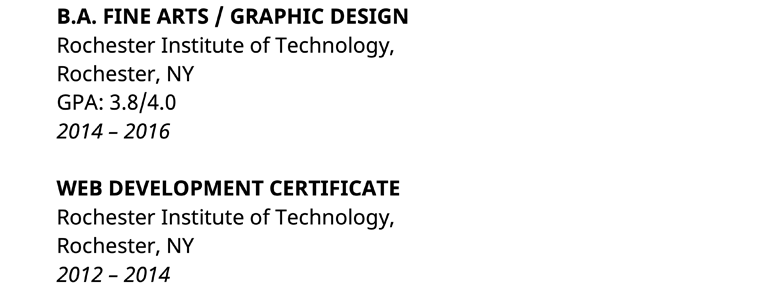
When you list certifications on your general resume, remember to mention the date the certification was awarded as well as the name of the awarding institution.
7. Include additional sections
For some employers, finding someone who fits in with the company work culture is high up on the list of priorities when screening candidates. When applying to such companies, adding hobbies and interests can make your resume stand out.
In other cases, volunteer work, personal projects or publications can help strengthen your resume. This is why including additional resume sections on your general resume can be a good idea, as long as it keeps your resume within the recommended length of one page.
Click to rate this article
4.8 Average rating


